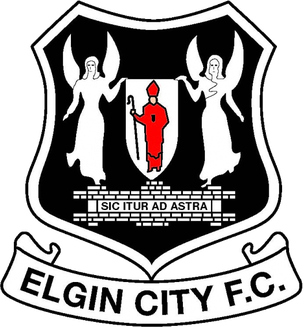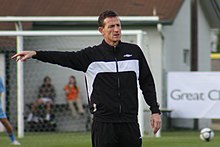
Falkirk Football Club is a Scottish professional association football club based in the town of Falkirk. The club was founded in 1876 and competes in the Scottish Championship, the second tier of Scottish football, as a member of the Scottish Professional Football League. The club was elected to the Second Division of the Scottish Football League in 1902–03, was promoted to the First Division after two seasons and achieved its highest league position in the early 1900s when it was runner-up to Celtic in 1907–08 and 1909–10. The football club was registered as a Limited Liability Company in April 1905 – Falkirk Football & Athletic Club Ltd.

Elgin City Football Club is a professional senior football club based in Elgin, Moray.
Alex Smith MBE is a Scottish former football player and manager. His major achievements over close to five decades as a manager include winning the Scottish Cup in 1987 with St Mirren and 1990 with Aberdeen, where he also won the Scottish League Cup in 1989. He had a role in the development of many prominent players, and the 2005 book on Scottish football, The Final Whistle? was described as "the nearest thing the Scottish game has to a father figure".
Stephen Crawford is a Scottish professional football coach and former player. He was most recently the interim manager of Lowland League club Cowdenbeath.
Gary Smith is a Scottish former professional footballer who played as a defender.

Robbie Neilson is a Scottish professional football manager and former player who is the head coach of USL Championship club Tampa Bay Rowdies.

William Dodds is a Scottish football coach and former player who was most recently the manager of Scottish Championship club Inverness Caledonian Thistle and works with BBC Scotland match commentary these days.
James Bett is a Scottish former professional association footballer who played in central or left midfield. He played with Aberdeen for nine seasons and had shorter spells at other clubs in Belgium, Iceland and Scotland. He earned 26 caps for the Scotland national team over eight years.
Brian Grant is a Scottish football coach and former professional footballer who is who played as a midfielder. He is currently head of player pathway and loans at Scottish Premiership club Dundee United. He spent twelve years as a player with Aberdeen, making over 300 appearances and winning three major trophies. He also played for Stirling Albion, Hibernian and Dundee.

The Scottish Women's Football League First Division was a division in the Scottish women's football pyramid between 1999 and 2019. The second league tier from 1999 to 2015, it was later the third tier from 2016 to 2019.

Martin Rennie is a Scottish football coach, who was most recently the manager of Scottish League One side Falkirk.
Jimmy Wilson is a Scottish former football player and manager, who played for Newcastle United, Morton, Aberdeen, Motherwell, Dundee and Falkirk. Wilson also represented the Scottish League once, in 1967. He later became player–manager of Elgin City, while they were a Highland Football League club.

The 2011–12 Scottish Cup was the 127th season of Scotland's most prestigious football knockout competition. The tournament began on 24 September 2011 and ended on 19 May 2012. It was sponsored by William Hill in the first season of a three-year partnership, known as the William Hill Scottish Cup. The winner of the competition qualified for the play-off round of the 2012–13 UEFA Europa League. Heart of Midlothian won 5–1 against city rivals Hibernian at Hampden Park.
Alex Cooper is a Scottish footballer who plays as a left-back.
The 2012–13 Scottish Cup was the 128th season of Scotland's most prestigious football knockout competition. The tournament began on 4 August 2012 and ended on 26 May 2013. It was sponsored by bookmaker William Hill in the second season of a three-year partnership and is known as the William Hill Scottish Cup. The winner of the competition qualified for the third qualifying round of the 2013–14 UEFA Europa League. The holders Hearts were knocked out by their Edinburgh rivals Hibernian in the fourth round, in a repeat of the previous season's final.
The 1913 Scottish Cup Final was the 40th final of the Scottish Cup, Scottish football's most prestigious knockout association football competition. The match took place at Celtic Park on 12 April 1913 and was contested by Division One clubs Falkirk and Raith Rovers. It was both Falkirk's and Raith's début appearance in the Scottish Cup Final.
The 2015–16 Scottish League Cup was the 70th season of Scotland's second-most prestigious football knockout competition. It is also known as The Scottish League Cup presented by Utilita for sponsorship reasons.
The 2015–16 season was the club's 3rd season in the Scottish Premiership and their fourth consecutive appearance in the top flight of Scottish football. Ross County also competed in the League Cup and the Scottish Cup.

The 2017–18 season was the 121st season of competitive football in Scotland. The domestic season began on 15 July 2017, with the first round of matches in the 2017–18 Scottish League Cup. The 2017–18 Scottish Professional Football League season commenced on 5 August.
The 2022–23 season was St Johnstone's tenth season in the Scottish Premiership and their fourteenth consecutively in the top flight of Scottish football. Saints were eliminated from the League Cup at the group stage. They also competed in the Scottish Cup.








